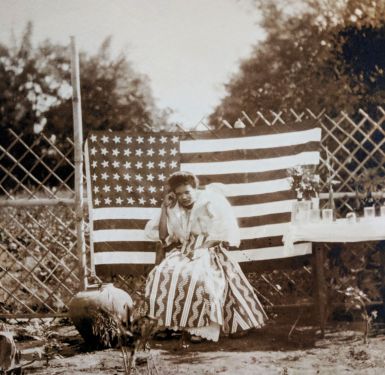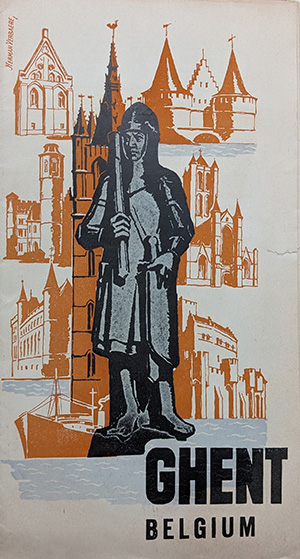"Passport to Peace": European Travel After World War II
January 30, 2024
 The Nathalie Furst Gittelman Travel Ephemera Collection contains ephemera documenting her experience flying to Europe in 1949 during her time as a college student at the University of Illinois, Urbana-Champaign. World War II ended only four years earlier, leaving many scars on the landscape and the people that lived through the war. The official travel guides and brochures, many aimed at English-speaking audiences, provide insight into the ways travel associations and government bureaus attempted to regain travelers' trust and recreational interest in Europe after a devastating period of loss.
The Nathalie Furst Gittelman Travel Ephemera Collection contains ephemera documenting her experience flying to Europe in 1949 during her time as a college student at the University of Illinois, Urbana-Champaign. World War II ended only four years earlier, leaving many scars on the landscape and the people that lived through the war. The official travel guides and brochures, many aimed at English-speaking audiences, provide insight into the ways travel associations and government bureaus attempted to regain travelers' trust and recreational interest in Europe after a devastating period of loss.
Furst traveled with a group of other female students through the Students International Travel Association (SITA) Inc. Before the trip, participants were provided with The Sita-Travel Scrapbook, which includes contextual information on European history, art, and culture, and brief language tutorials. The Scrapbook notes that its revised edition is the first revision to the guide made since World War II. The transatlantic flight was Furst's first experience on an airplane. She notes in correspondence in her travel diary that she "felt as tho [sic] I were really riding on a cloud." She compared the plane with the less glamorous experience of riding trains, and noted that being on a plane made her "feel like a queen!" Once she arrived in Europe, she visited Belgium, France, Germany, Great Britain, Ireland, Italy, Monaco, and Switzerland. Along the way she saved travel booklets, maps, programs, tickets, and other ephemera.
One colorful, promotional brochure encouraging travel to France noted that, "no ordeal has been more cruel than that to which she has just been submitted. She has been mercilessly trodden upon, terribly mutilated. Yet it was not in her destiny that she was to perish...And here is the first new self-portrait that she is sending to her foreign friends." Although the booklet displayed beautiful images and promoted exciting locales to visit, it was also realistic in acknowledging that, "Time must pass before ravaged landscapes can recover their former beauty."
While in France, Furst attended a performance at the Folies Bergère, an opera house originally opened in the mid-19th century. Before the war Josephine Baker often performed there, and she is listed as performing again during Furst's visit in 1949. The return to pre-war performances lends a sense of trying to return to a new normalcy post-war.
The scars of war are also openly discussed in promotional materials for Germany. The German Tourist Association's "Calendar of Events" notes that 1949 is the first time since the war ended that they published "a complete list of all events in Germany, scheduled to take place in the American, British, and French occupied Zones," noting the new political landscape of Allied occupation. Another German travel guide offered additional text describing the boundaries of the American, British, French, and Russian Zones of Occupation. The event calendar highlighted many events honoring the 200th anniversary of German writer Johann Wolfgang von Goethe's birthday. Rather than focus on more recent events, the German Tourist Association looked further back in German regional history to highlight a positive past, rather than presenting a reckoning of recent years.
A London travel guide lamented that, "we would have preferred to forget the war; we would have liked to remember only the friends we made during those tragic years, and to recollect nothing of the suffering which we endured. But the scars made by the war are so deep and so many that there is no turning away from them." Although Furst's trip was an incredible experience for her, the memories of war were still imprinted on the built environment and on the minds of those that lived through it. The English-language Italian brochures Furst collected have more subtle references to the war. "Invitation to Glorious Italy" promoted travel in the post-war period by simply stating that, "Understanding...though travel...is the passport to peace."
Image Gallery
Post tagged as: special collections, diaries, ephemera, international
Read more Peek in the Stacks blog entries










